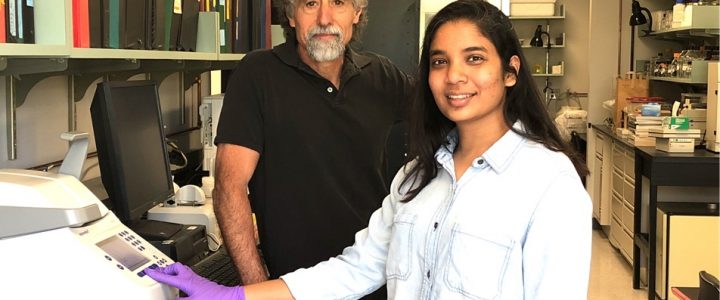Explore groundbreaking research by the University of Massachusetts Medical School and Rush University Medical Center on alternative splicing in white blood cells as a biomarker for Fragile X syndrome, paving the way for personalized treatment optimization through a non-invasive blood test.
Read moreResearcher
2021 FRAXA Awards – Recognizing Perseverance and Dedication
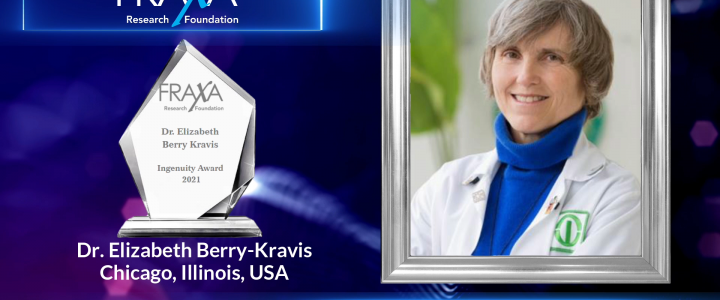
In conjunction with World Fragile X Day 2021, FRAXA Research Foundation is proud to recognize its annual award recipients. This year’s recipients exemplify the perseverance and dedication that has made FRAXA a global leader in Fragile X research for nearly 30 years. We are fortunate to partner with these individuals on research, community support and awareness efforts.
Read moreLink Between Lipid Profile, eCBome System and Gut Microbiome in Fragile X Syndrome

Why does obesity challenge so many people with Fragile X? Dr. Caku’s team thinks changes in the gut are the culprit. This team has found that Fragile X syndrome causes changes in the tiny organisms that live in our gut. They believe that these abnormalities cause changes in the brain which impair learning and behavior.
Read moreCharacterization of Microglia Transcriptional Profile in Fmr1 Knockout Mice Model

With this grant, the team will identify the pathways responsible for this excessive activation and attempt to reverse the excess. If they can correct this using drugs, they will be able to identify a new potential treatment for Fragile X syndrome solving one more piece of the Fragile X brain puzzle.
Read moreThe Role of Astrocyte BMP Signaling in Fragile X Syndrome

Astrocytes are star-shaped cells that make up one fifth of all cells in the human brain. Recently researchers found a specific pathway in astrocytes that is overactive in Fragile X syndrome, and they hope to bring this pathway back to normal with a drug. With this grant, the team will try to correct the pathway in Fragile X mice. The hope is that they will find a new potential treatment approach for Fragile X syndrome.
Read moreIdentifying Cellular and Molecular Signatures in Human Neurons That Distinguish Fragile X Syndrome Patients with Divergent EEG Profiles

Why is it so hard to find the right medications to help people with Fragile X syndrome? Just as Fragile X affects individuals differently, medications do as well. This project aims to bring personalized medicine to Fragile X syndrome.
Read morePreclinical Testing of High Fat/Low Carb Diets in Fragile X Mice and Cells
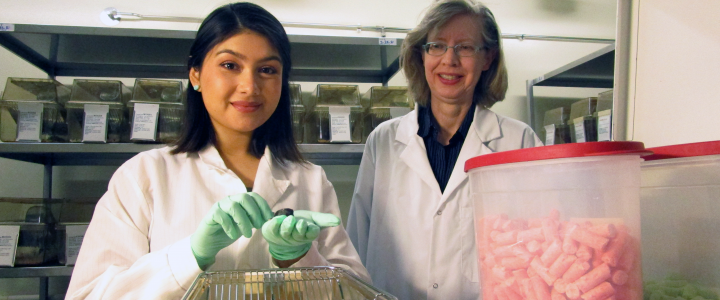
With a $90,000 research grant from FRAXA, Dr. Cara Westmark’s team will use mice to determine if more palatable Atkins-type diets can improve sleep and boost learning skills for those with Fragile X syndrome.
Read moreDrug Tolerance in MGluR5 Clinical Trials – Dr Patrick McCamphill 1:1 with FRAXA

We have long suspected that the clinical trials of mGluR5 blockers from Novartis and Roche failed because the drug triggered tolerance, losing effect over time. With a $90,000 grant from FRAXA, Dr. Patrick McCamphill, a Postdoctoral Fellow in the MIT lab of Dr. Mark Bear, is investigating. He does indeed find tolerance, and now he is looking for ways to overcome it.
Read moreFRAXA Drug Validation Initiative (FRAXA-DVI)

The FRAXA Drug Validation Initiative (FRAXA-DVI) provides speedy, cost-effective, objective preclinical testing of potential Fragile X treatments. FRAXA-DVI uses in-vitro systems, behavior batteries, and gene expression and peripheral biomarker platforms to validate investigational new drugs and repurposed available compounds in Fragile X syndrome (FXS).
Read morePharmacotherapeutic Effects of Cannabidiol (CBD) in Fragile X syndrome (FXS) and Autism Spectrum disorder (ASD)

This study will test CBD (cannabidiol) treatment in male and female Fragile X mice to learn how and why it works and whether gender affects responses to CDB treatment. Along with clinical trials, this study will help us to understand and optimize the potential of CBD as a behavior-regulating treatment for Fragile X.
Read moreCellular-Specific Therapeutic Targeting of Inhibitory Circuits in Fragile X Syndrome
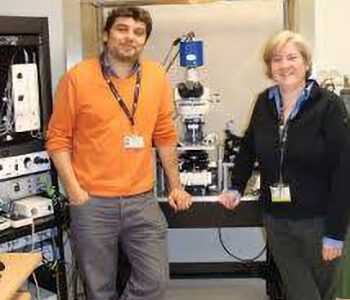
Studies have shown that the function of inhibitory networks is disturbed in Fragile X. This abnormality is not well understood but appears to be secondary to abnormalities in metabotropic glutamate and endocannabinoid systems. With a $90,000 grant from FRAXA, Dr. Molly Huntsman’s team examined how these networks interact and how inhibitory deficits can best be remedied.
Read moreAuditory Dysfunction in Fragile X Syndrome in a Mouse Model of Fragile X
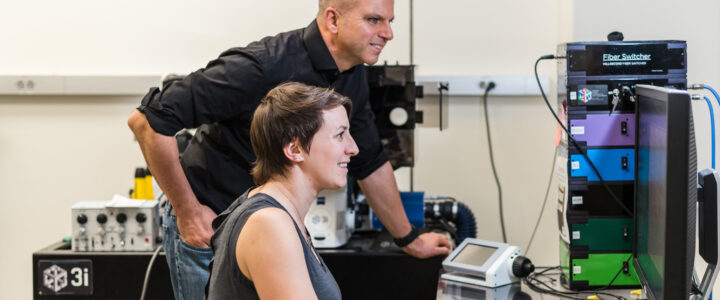
With a $90,000 grant from FRAXA, Dr. McCullagh and Dr. Achem Klug at the University of Colorado investigated whether auditory neural circuits are altered in Fragile X mice. They saw minor differences in these mice compared to B6 (control) mice in several measures of auditory acuity. Fmr1 mice had increased latency to the startle response for almost all conditions compared to B6 mice, suggesting altered timing to acoustic cues. These experiments show that, consistent with patient reports and anatomical/physiological data, the auditory system is altered in a mouse model of FXS, though with some potential compensation leading to a subtle behavioral impact.
Read moreClinical Trials and Cyclic AMP in Fragile X Syndrome: A Life Journey

In November 2020, a phase II clinical trial reported extremely successful results. This clinical trial of a PDE4D inhibitor from Tetra Pharmaceuticals was conducted by Dr. Elizabeth Berry-Kravis at Rush University Medical Center and funded by FRAXA Research Foundation. In this Simons Foundation lecture, Elizabeth Berry-Kravis traces 30 years of Fragile X research, from identifying its cause, through finding dozens of treatment targets, through a series of disappointing clinical trials.
Read moreScreening Combinatorial Pharmacological Therapies for Fragile X Syndrome
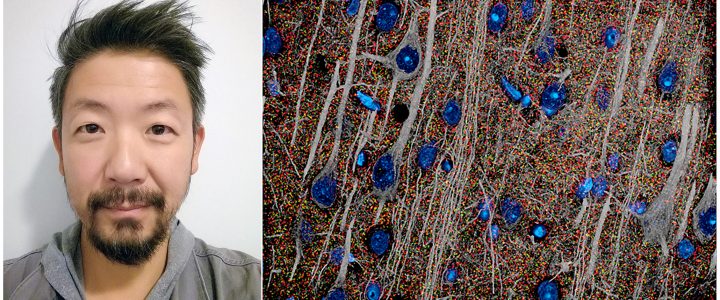
FRAXA Research Foundation has awarded a $90,000 research grant to Stanford University principal investigators Dr. Philippe Jacques Mourrain and Dr. Gordon Wang, along with postdoctoral fellow, Dr. Rochelle Coulson. They are evaluating additive effects of combinatorial drug treatments to correct a broad spectrum of deficits observed in Fragile X syndrome.
Read moreParkinson’s Therapy May Hold Promise for Fragile X

A study funded by FRAXA in Italy has encouraging results for people with Fragile X: drugs that block adenosine receptors (A2A) reversed signs of Fragile X in a mouse model.
“One of the most intriguing things about this study is that it points to an entire drug class (not just the one drug used) as potentially therapeutic for Fragile X. Many available compounds block A2A receptors, and we know they are safe and effective.
Read moreBeneath the Surface of Fragile X Syndrome: Study Sheds Light on What’s Happening in Nerve Cells

This FRAXA-funded project has turned up some surprising results. At first, it might seem Kurosaki and Maquat have found yet another cellular process which is malfunctioning in Fragile X. But this finding is intimately related to previous findings of abnormal protein synthesis and misregulated transcription in Fragile X. FMRP (the protein lacking in Fragile X syndrome) is involved in chaperoning messenger RNAs within cells to active sites, and in controlling their translation into many different proteins. Some of these proteins are transcription factors, which feed back to the nucleus to control gene expression.
Read moreIntegrating Human and Mouse Studies in Fragile X Syndrome – an NIH Center Approach

Presentations by:
Craig Erickson – Translational medicine and mechanistic studies of brain neurophysiology in Fragile X Syndrome: A NIH Center Overview
Ernest Pedapati – Network Mechanisms, Biomarkers, and Pharmacology of Fragile X Syndrome in Humans
Devin Binder – Network Mechanisms of Neurophysiology and Behavior in mouse models of Fragile X Syndrome
Kimberly Huber – FMRP Regulation of local and long-range neocortical circuits in the mouse: Links with EEG phenotypes
Developing Arbaclofen for Fragile X – Dr. Mark Bear 1:1 with FRAXA

Seven years ago, arbaclofen (STX209) was pulled from development, disappointing families around the US. Now MIT professor and FRAXA Investigator Dr. Mark Bear has founded Allos Pharma to bring it back. Dr. Bear sat down with FRAXA co-founder Katie Clapp to share the story and next steps.
Read moreTowards Understanding the Role of FMRP in Human Brain Development Using Brain Organoids

Dr. Zhexing Wen and Dr. Peng Jin of the newly funded Fragile X Center of Excellence at Emory University School of Medicine join us in this seminar to present about Understanding the Role of FMRP in Human Brain Development Using Brain Organoids.
Read moreInterrogate the Functions of FMRP in Brain Development Using Stem Cells

Dr. Xinyu Zhao of the Waisman Center and Department of Neuroscience at University of Wisconsin-Madison joins us in this seminar to present Interrogate the Functions of FMRP in Brain Development Using Stem Cells.
Read moreAllos Pharma Revives Arbaclofen After 7 Years: New Hope for Fragile X Syndrome

Experience the revival of arbaclofen as Allos Pharma Inc launches a new development program, providing renewed hope for the Fragile X community. Discover the impact of this experimental drug and the determination of those who never gave up.
Read morePositive Results Reported in Phase II Fragile X Clinical Trial of PDE4D Inhibitor Zatolmilast from Tetra Therapeutics

Today, Tetra Therapeutics announces the first unequivocally positive phase 2 clinical trial in Fragile X syndrome, press release below. The results do not depend on carving out a subset of patients or post hoc analysis.
Read moreUse of EEG as a Biomarker for Diagnosis and Outcomes in Neurodevelopmental Disorders

A series webinars focused on current topics in Fragile X research featuring Charles A. Nelson III, PhD, Professor at Harvard Medical School and Carol Wilkinson, MD, PhD, Instructor at Boston Children’s Hospital.
Read moreGenome-wide Screen for FMR1 Reactivation in Human FXS Neural Cells
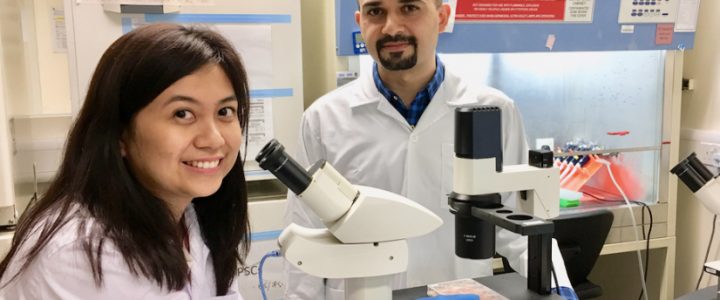
Drs. Mahmoud Pouladi and Kagistia Utami at the Agency for Science, Technology and Research (A*STAR) in Singapore were awarded a $67,500 research grant from FRAXA Research Foundation and that led to much greater governmental funding to expand this work. Their goal is to reactivate the gene which is silenced in people who have Fragile X syndrome.
Read moreYale Researcher Dr. Elizabeth Jonas 1:1 with FRAXA

We talk with Dr. Elizabeth Jonas, Professor of Internal Medicine and Neurology at Yale School of Medicine, about her new research suggesting that leaky mitochondria cause some symptoms of Fragile X syndrome. Leaky membranes may also be involved in Parkinson’s Disease and other diseases.
Read more
